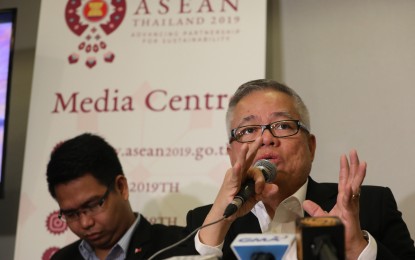
DELAYED TRADE DEALS. Trade Secretary Ramon Lopez (right) speaks at the Asean summit in Bangkok on Friday (June 21, 2019). He said the implementation of the Regional Comprehensive Economic Partnership (RCEP), considered to be the biggest trade deal between Asean countries plus six other nations, was being delayed by a lot of factors. (PNA photo by Avito Dalan)
BANGKOK -- Department of Trade and Industry Secretary Ramon Lopez on Friday said the implementation of the Regional Comprehensive Economic Partnership (RCEP), considered to be the biggest trade deal between Asean countries plus six other nations, was being delayed by a lot of factors.
“Not every country is on the same level. We have reached a point to really demand from the different negotiation parties to be more realistic, pragmatic,” Lopez told reporters on the sidelines of the Asean 34th meeting here.
Negotiations for the RCEP, which includes India, China, Japan, South Korea, Australia and New Zealand, has been going on for the past seven years already but Lopez said it has been progressing.
For one, he said that seven out of the 18 chapters on RCEP had concluded and they were hopeful that it can be completed before November.
“It's really a long and comprehensive (Free-Trade Agreement) involving 16 countries. When it comes to details of the negotiation like products and services rules of origin, government procurement competition. many discussions taking place, there are different sets of targets, level of liberalization,” he said.
Lopez agreed that some countries have demanded more so that RCEP can move forward but added that it was not easy for everyone involved.
“In the end it's recognizing the level of development, preparedness. Not every country is on the same level,” he said.
For the Philippines, he said one of the hindrances was the constitutional provision on economy, which “we cannot change overnight.”
However, he said that “basically we are reaching many green lights (although) there is a couple of orange.”
Lopez said while RCEP is a major issue among Asean countries, it was not on the agenda of Asean 34th summit.
“RCEP maybe tackled, it's not in the agenda,” he said.
Thailand had earlier said that it was hoping that RCEP can be finalized in November.
“As global trade has been rocked by the ongoing US-China trade tensions, all 10 Asean members have voiced support for completion of the RCEP negotiations by the end of this year,” Auramon Supthaweethum, the director general of Thailand's Commerce Ministry’s Department of Trade Negotiations, had told a Thai newspaper. (PNA)
